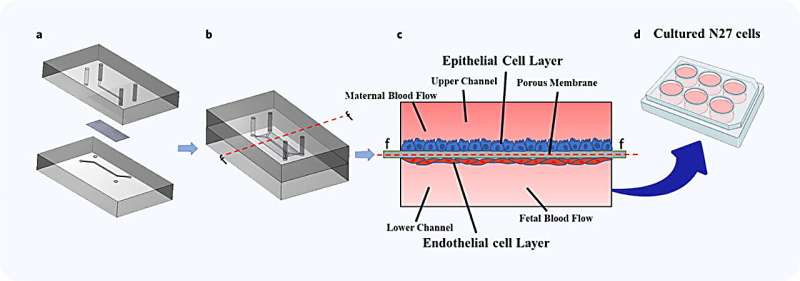This article has been reviewed according to Science X's editorial process and policies. Editors have highlighted the following attributes while ensuring the content's credibility:
fact-checked
trusted source
proofread
Placenta-on-a-chip study addresses potential effects of pharmaceutical agents on fetus

Concerns about the impact of pharmaceutical agents on fetal development have prompted researchers at Iowa State University to undertake a key study using a placenta-on-a-chip model. The study, focused on the transport of naltrexone (NTX) and its primary metabolite 6β-naltrexol, sheds light on their potential effects on the developing neural system of fetuses and their premature brains.
The placenta-on-a-chip model was fabricated and meticulously tested to simulate the transport of NTX/6β-naltrexol from the maternal channel to the fetal channel. From the fetal channel, the transported NTX/6β-naltrexol was collected and directed toward cultured N27 neural cells. The neural cells were then evaluated for gene expression and cell viability following exposure to the pharmaceutical agents.
The study revealed intriguing findings, notably the significantly higher fold changes in interleukin-6 (IL-6) and tumor necrosis factor-alpha (TNF-α) expression in neural cells exposed to NTX/6β-naltrexol. Conversely, the fold change in interleukin-1 beta (IL-1β) expression was lower, while the sphingosine kinase 1 (sphk1) expression remained constant. Moreover, cell viability was significantly lower when exposed to NTX/6β-naltrexol.
These results hold particular significance since previous reports have linked elevated IL-6 and IL-1β expression levels to increased plasma levels in fetal brains and acute inflammatory insults in developing brains. Similarly, the possibility of TNF-α reducing embryonic brain development has been reported. On the other hand, sphk1 enzyme is associated with increasing cell survival and proliferation, contributing to standard physiological functions in developing brain cells.
During the study, the mean fetal concentrations of NTX and 6β-naltrexol over an 8-hour interval were recorded. The findings provide critical insights into how NTX/6β-naltrexol affects embryonic brain cells, further supporting the need for ongoing research in this area.
By utilizing advanced liquid chromatography/mass spectrometry (LC-MS), the study effectively analyzed the transport of clinically relevant concentrations of NTX and 6β-naltrexol.
"This proof-of-concept marks an important step forward in understanding the impact of pharmaceutical agents on the developing neural system and premature brains of fetuses." said Nicole Hashemi, the principal investigator on the project. "As we delve deeper into these mechanisms, we hope to contribute to the development of safer medications for pregnant women and their unborn children."
The placenta-on-a-chip microsystems have potential in transforming our understanding of how pharmaceutical agents affect fetal development. This technology can provide insights into the complex processes that occur during pregnancy, ensuring safer and more informed medical practices.
While this study has made major strides, the researchers emphasize the need for further studies to validate and expand upon these findings. Continued research in this field is vital to ensure the well-being of both mothers and their unborn children.
The study is published in the journal Innovation and Emerging Technologies.
More information: Rajeendra L. Pemathilaka et al, Placenta-on-a-chip: Response of neural cells to pharmaceutical agents transported across the placental barrier, Innovation and Emerging Technologies (2023). DOI: 10.1142/S2737599423400042



















